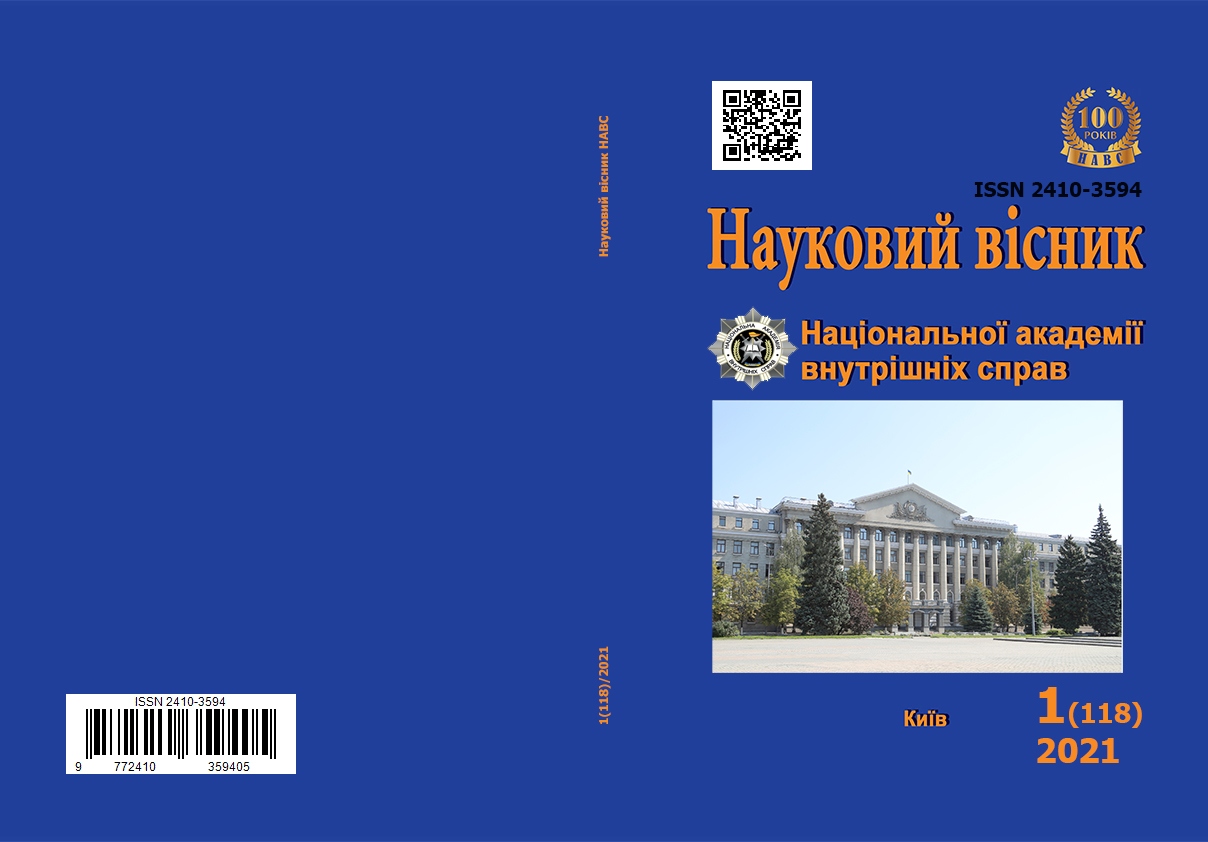Using Methods of Criminal Analysis during Expeditious Proceedings and Pretrial Investigation
Abstract
The purpose of the article is to develop and popularize recommendations related to using different methods of criminal analysis during expeditious proceedings and pretrial investigation provided by operational and search units of National Police. Methodology. Taking into account the purpose of article, specifics of object and subject of research it was taken couple of methods. Methodological base of article is the dialectical approach to analysis of using criminal analysis during conducting activities by operational and search units. In research we used the system of scientific methods: formal logic (abstraction, deduction, induction, analogy, synthesis) to detail the meaning of issues; empirical method – during carrying out experiments and interviewing exerts; system analysis method – to consider the innovational ways for solving the issues; theoretical method – during discovering scientific and methodological literature; modelling – during discovering certain objects by modelling their separate aspects. Scientific novelty. The article is a innovational due to necessity of modernization of modern forms and methods of criminal analysis during criminal and expeditious proceedings.It was developed algorithm of conducting analysis information about communication (this analysis is carrying out by officers from operational units at the request of investigators of National Police of Ukraine). Conclusions. It was developed and proposed some changes to Law of Ukraine «About Operational search activity». For example, it was proposed to add (in paragraph 4 first part of article 8) that due to conducting tasks of operational search work it is necessary to get information (that is a property of operators and providers of telecommunication about communications, subscribers, provision of telecommunication services, including receipt of services, their privacy, content, routes of transmission) according to articles 159–166b of Criminal Code of Ukraine taking into account the features mentioned in second part of article 8 of the same Code. Outcomes of research could be used in carrying out scientific projects in this sphere and also police officers in prevention of crimes.
Keywords: analysis information about communication; operational units; criminal analysis; operational search measures; covert investigative actions.
Downloads
References
Білоус Р. В. Кримінальний аналіз в діяльності правоохоронних органів України. Удосконалення механізму правового регулювання суспільних відносин з урахуванням зарубіжного досвіду : зб. матеріалів Міжнар. наук.-практ. конф. (Київ, 1 черв. 2020 р.) / відп. ред. О. Ю. Бусол. Київ : Ліра-К, 2020. С. 20–22.
Фаріон О. Б. Метод стратегічного кримінального аналізу загроз прикордоній безпеці України. Збірник наукових праць Національної академії Державної прикордонної служби України. 2021. № 83 (2). С. 223–241. (Серія «Військові та технічні науки»). doi: https://doi.org/10.32453/3.v83i2.569.
Калиновський О. В., Школьніков В. І. Використання методу кримінального аналізу для протидії організованій злочинності. Часопис Київського університету права. 2017. № 1. С. 300–303.
Основи кримінального аналізу : посібник / [О. Є. Користін, С. В. Албул, А. В. Холостенко та ін.]. Одеса : ОДУВС, 2016. 112 с.
Тактичний кримінальний аналіз: теорія та практика : навч. посіб. / [О. Є. Користін, Н. П. Свиридюк, О. М. Цільмак та ін.]. Одеса : РВВ ОДУВС, 2019. 216 с.
Кримінальний процесуальний кодекс України : Закон України від 13 квіт. 2012 р. № 4651-VI. URL: http://zakon5.rada.gov.ua/laws/show/4651-17.
Кузнєцов М. В., Василинчук В. І. Правові аспекти використання методів кримінального аналізу оперативними підрозділами Національної поліції України під час тимчасового доступу до інформації про зв’язок. Використання досягнень сучасної науки й техніки в розкритті злочинів : матеріали міжвідом. наук.-практ. круглого столу (Київ, 25 лют. 2021 р.) / [редкол.: В. В. Чернєй, С. Д. Гусарєв, С. С. Чернявський та ін.]. Київ : Нац. акад. внутр. справ, 2021. С. 21–26. URL: http://elar.naiau.kiev.ua/jspui/bitstream/123456789/18320/1/%d 0%92%d0%b8%d0%ba%d0%be%d1%80%d0%b8%d1%81%d1%82%d0%b0%d0%bd%d0%bd%d1%8f%20%d0%b4%d0%be%d1%81%d1%8f%d0%b3%d0%bd%d0%b5%d0%bd%d1%8c%20%2025.02.2021.pdf.
Одерій О. В. Відкриття кримінального провадження (окремий аспект). Наукові праці Національного університету «Одеська юридична академія». 2017. Т. 19. C. 259–266. doi: https://doi.org/10.32837/npnuola.v19i0.508.
Про оперативно-розшукову діяльність : проект Закону України від 2 верес. 2019 р. № 1229. URL: http://w1.c1.rada.gov.ua/pls/zweb2/webproc4_1?pf3511=66597.
Саковський А. А. Оперативно-розшукове документування як пошуково-пізнавальний процес і складник оперативно-розшукової діяльності. Підприємництво господарство і право. 2020. № 7. С. 371–377. doi: https://doi.org/10.32849/2663-5313/2020.7.63.
Стащак А. Ю. Наступальність у контексті принципів оперативно-розшукової діяльності. Юридичний бюлетень. 2019. Вип. 11. Ч. 2. С. 284–289. doi: https://doi.org/10.32850/2414-4207.2019.11-2.37.
Цигикал П. Кримінальний аналіз як елемент системи інформаційного забезпечення оперативно-розшукової діяльності. Збірник наукових праць Національної академії Державної прикордонної служби України. 2017. № 2. С. 234–240. (Серія «Військові та технічні науки»).
Про оперативно-розшукову діяльність : Закон України від 18 лют. 1992 р. № 2135-XII. URL: http://portal.rada.gov.ua/laws/show/3341-12.
Abstract views: 1130 PDF Downloads: 1574
- Authors reserve the right to authorship of their own work and transfer to the magazine the right of the first publication of this work under the terms of the Creative Commons Attribution License, which allows other persons to freely distribute published work with mandatory reference to authors of the original work and the first publication of an article in this magazine.
- Authors have the right to enter into separate additional agreements on non-exclusive dissemination of the work in the form in which it was published in the journal (for example, to post an article in the institution's repository or to publish as part of a monograph), provided that the link to the first publication of the work in this journal is maintained.
- The journal's policy allows and encourages the posting of articles by authors on the Internet (for example, in electronic storehouses of institutions or on personal websites), both before the submission of this manuscript to the editorial office and during its editorial processing, as this contributes to the creation of a productive scientific discussion and positively affects the efficiency and dynamics of citing the published work.




